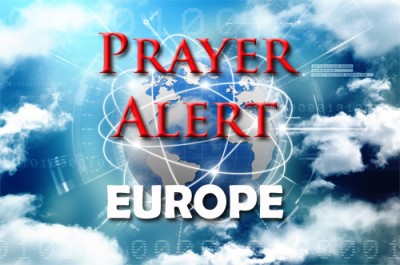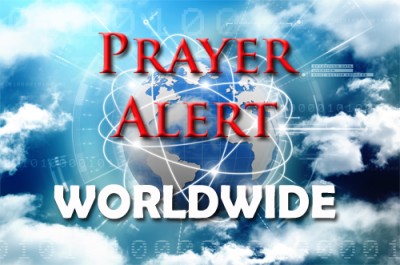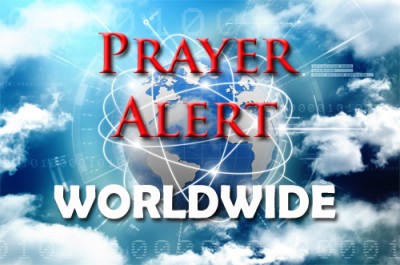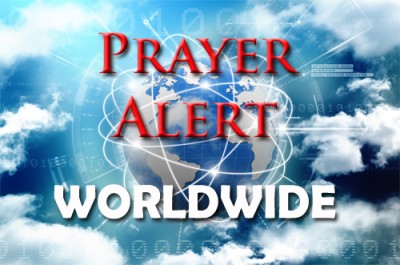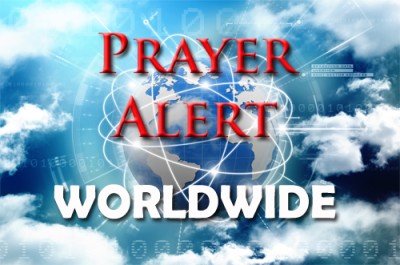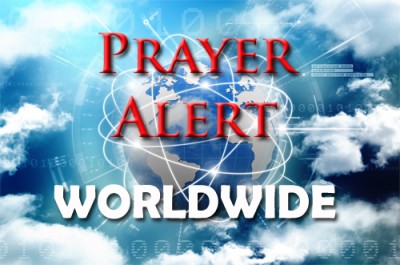Two alleged spies, dual German-Russian nationals, have been arrested in Bavaria for suspected espionage related to sabotaging German military aid for Ukraine. The main suspect, Dieter S, is accused of various offences, including maintaining contact with Russian intelligence, and fighting for a Russian proxy force in eastern Ukraine. Allegedly, he was planning sabotage operations such as explosive and arson attacks on military and industrial infrastructure, including US military facilities. Germany is the second-largest donor of military aid to Ukraine after the USA. The arrests mark another blow against Russian espionage efforts in Germany. Meanwhile, in what is being called Austria’s biggest espionage scandal in decades, Egisto Ott has been arrested on suspicion of spying. He is believed to have been recruited, along with other officials, by Jan Marsalek, who fled to Moscow in 2020. See
This year’s Easter celebrations in the Middle East were subdued. In Gaza City, Christians who have found refuge in the Holy Family Church brought palm branches to the Palm Sunday service. One of their priests said the congregation has been ‘enduring relentless Calvary for months’. SAT-7 broadcast Easter services live from the Evangelical Lutheran Church in Bethlehem. The church’s pastor said, ‘In Palestine our Good Friday has lasted way too long, but Easter reminds us that the final word belongs to God… Our belief in the God of the Resurrection means that ultimately goodness, righteousness, and justice will prevail’. There were few foreign pilgrims in Jerusalem and most West Bank Christians were denied access under tightened security rules. SAT-7’s Turkish channel broadcast a service from a church in Istanbul which had been attacked by two gunmen during a Sunday service on 28 January; one man was killed in the incident. SAT-7 wanted to show solidarity with the congregation after such a traumatic event. SAT-7’s Easter programming is especially important for those in countries where people cannot celebrate openly because of persecution and restrictions on religious freedom.
Australia: two stabbings in Sydney
18 Apr 2024Sydney is reeling after two knife attacks within three days. At Bondi Junction, Joel Cauchi, who had a history of mental illness, killed six people and injured others. At a church in Wakeley, a teenager injured a bishop and several others, but there were no fatalities. Despite both incidents causing fear, they have been treated differently by authorities. The Wakeley stabbing was declared a terror incident, while the Bondi Junction attack was not. This has caused puzzlement: the local Islamic Council ‘found it bewildering’, and said, ‘The signal this sends to the Australian community is that terrorism is solely reserved for Muslims.’ The investigation into the Bondi Junction attack continues, focusing on the perpetrator's motives and actions. One of the men who confronted Cauchi has been promised a renewal of his temporary visa: see
The USA, South Korea, and Japan are proposing a new multinational panel outside the UN to enforce sanctions against North Korea. Russia rejected renewing the UN panel which has monitored sanctions for fifteen years, and China abstained. The new panel, with support from allies like Australia and New Zealand, would aim to continue the UN’s work. Though lacking UN endorsement, it could monitor North Korea more effectively, and could also oversee human rights resolutions on North Korea. US ambassador Thomas-Greenfield is discussing options with South Korea and Japan. Noting that Moscow and Beijing have called for easing sanctions to restart diplomacy and ease humanitarian suffering in the impoverished nation, he urged them to reverse course, and stop rewarding North Korea's bad behaviour.
The USA may need to reassess its relationships with African nations as it faces a potential shortage of critical minerals essential for weapon manufacturing. This comes as it and its allies provide arms to conflict zones like Ukraine and Israel. In both cases, these include advanced missile systems which rely on critical minerals found in Africa. These include cobalt, sourced from the Democratic Republic of Congo, antimony from South Africa, and graphite (found in many countries). A study group has warned that a shortage of these minerals could hinder military capability and national security, impacting the arms race with China. In its policy towards Africa, the US has shown renewed interest in the DRC and Zambia through the rebuilding of the Lobito Corridor, a rail and road network which will link the two countries to Angola and straight to the Atlantic Ocean.
USA: Trump on trial, could face many witnesses
18 Apr 2024On 15 April Donald Trump became the first former president ever to face a criminal trial. He is accused of falsifying business records related to hush money payments to actress Stormy Daniels (who claims that he had sex with her) before the 2016 election. Prosecutors allege Trump reimbursed his lawyer, Michael Cohen, for the payments and falsely labelled it as a legal fee. Trump pleaded not guilty and called the case a ‘witch hunt.’ New York judge Juan Merchan has named over forty potential witnesses, including many former associates, including Cohen and Rudy Giuliani, as well as Trump's family members and former employees. Merchan has also warned Trump of potential jail time for disrupting or refusing to attend the trial without a valid reason. In jury selection, many potential jurors are being ruled out because they could not be impartial. What is not clear is whether this trial will influence the result of November’s presidential election: see
Unite US, led by Tonya Prewett, is spearheading a wave of student baptisms at public universities, beginning with Auburn University and expanding to three other universities, each witnessing hundreds of baptisms. The movement, fuelled by Prewett's vision to address student struggles, saw about 5,000 students at its first event with 200 baptisms. Emphasising follow-up, Unite US collects contact details of baptised students for spiritual support through local churches and ministries. Many participants report transformative experiences, including overcoming depression and addiction. Keynote speakers like Jonathan Pokluda note a rising revival among college students, seeking a deeper, daily faith beyond routine church visits. This revival trend, mirroring the spontaneous Asbury Revival, signifies a profound shift towards personal faith and active community engagement among university students.
From prison to Jesus' mission of second chances
11 Apr 2024‘Arrested at 8 and abandoned as a child, I turned to crime, leading to an eleven-year sentence at 19. In prison, my cellmate, a devout Christian, introduced me to the Gospel. Eventually, I accepted Jesus, and my faith grew, especially in solitary confinement. Post-release, I faced many hurdles common to the 1.9 million incarcerated in the USA, with over 450,000 re-entering society annually. They have to grapple with problems like finding employment and housing. After my release at 26, I worked minimum-wage jobs, pursued education, and obtained a master's in professional counselling. Now with Prison Fellowship, I long for the redemption of the incarcerated. Despite the stigma and legal barriers hindering re-entry, support and resources are crucial for successful reintegration. Churches and organisations can play a vital role, as they did in my life, offering practical and spiritual support. My journey reflects the transformative potential of faith and community in offering a second chance to those who have been in prison.’
